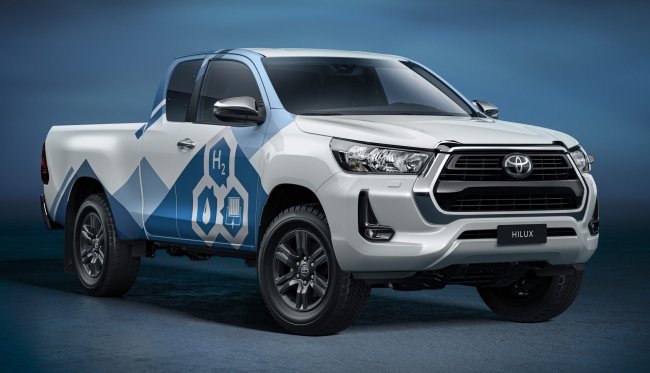3 minute read - 5th December 2022
Toyota secures £11.3m funding for hydrogen project
A Toyota-led consortium has secured £11.3m worth of government funding to support the development of a prototype hydrogen fuel cell-powered version of its Hilux pick-up at the company’s UK vehicle plant in Burnaston, Derbyshire. Toyota Motor Manufacturing UK (TMUK) has secured the UK government funding for the project through the Advanced Propulsion Centre (APC).
This new opportunity to bring zero emission technology to the commercial vehicle market reflects evolving customer demand and Toyota’s 360-degree approach to sustainable mobility across all sectors. The APC funding will enable TMUK to develop hydrogen technologies for this specific vehicle market segment during the next three years.
The consortium includes UK-based technical engineering partners Ricardo, ETL, D2H and Thatcham Research. While TMUK is leading the project, Toyota Motor Europe R&D will provide technical support to enable the UK-based teams to build their expertise and become self-sufficient in developing next generation hydrogen drivetrain technologies.

Toyota has secured £11.3m of funding to support the development of a hydrogen fuel cell electric Hilux / Picture: Toyota GB
The project will make use of components from Toyota’s second generation fuel cell system, as featured in the latest Toyota Mirai saloon, to transform a Hilux into an electric vehicle.
Within the scope of the funding bid, initial prototype Hilux vehicles will be produced at Burnaston during 2023. Once successful performance results have been secured, the intention is to prepare the vehicle for small series production. The project provides an opportunity to investigate a further application of Toyota’s fuel cell technology in a vehicle segment that is key to a number of industry groups and will help support the sector’s move towards decarbonisation.
Richard Kenworthy, TMUK managing director, said: “The opportunity that this funding enables is significant and goes towards developing the technical capabilities not only of our employees here at our site in Burnaston in the East Midlands but also of those within the wider consortium partners. This region is heavily committed to supporting zero emissions mobility and we see this project as a great opportunity to contribute to the critical path on the road to carbon zero mobility. This UK government funding will enable teams within the consortium to acquire key skills that can then be used to investigate other fuel cell applications.”
Matt Harrison, Toyota Motor Europe president and CEO, added: “The UK is one of the key markets for pick-up trucks and an important market for Toyota. This funding represents a tremendous opportunity to develop a zero emission solution in a critical market segment. We would like to thank the UK government for the funding that will enable the consortium to investigate the development of a fuel cell powertrain for the Toyota Hilux, supporting our carbon neutrality ambition.”
Toyota pioneered vehicle electrification with the introduction of Prius, the world’s first mass-market hybrid car, more than 20 years ago. It continues to promote a multi-technology path towards carbon neutrality, offering a diverse range of electrified technologies, including hybrid electric, plug-in hybrid electric, battery electric and fuel cell electric. Establishing a successful hydrogen transport sector is an essential element in achieving this goal.
The APC plays a key role in the UK’s automotive sector, offering opportunities to bridge the gap between industry and future technological requirements. It aims to help achieve significant changes in the industry, creating commercial and strategic outcomes that benefit the UK. Its funding specifically covers the later-stage research and development that progresses a product from proof-of-concept to a prototype vehicle.